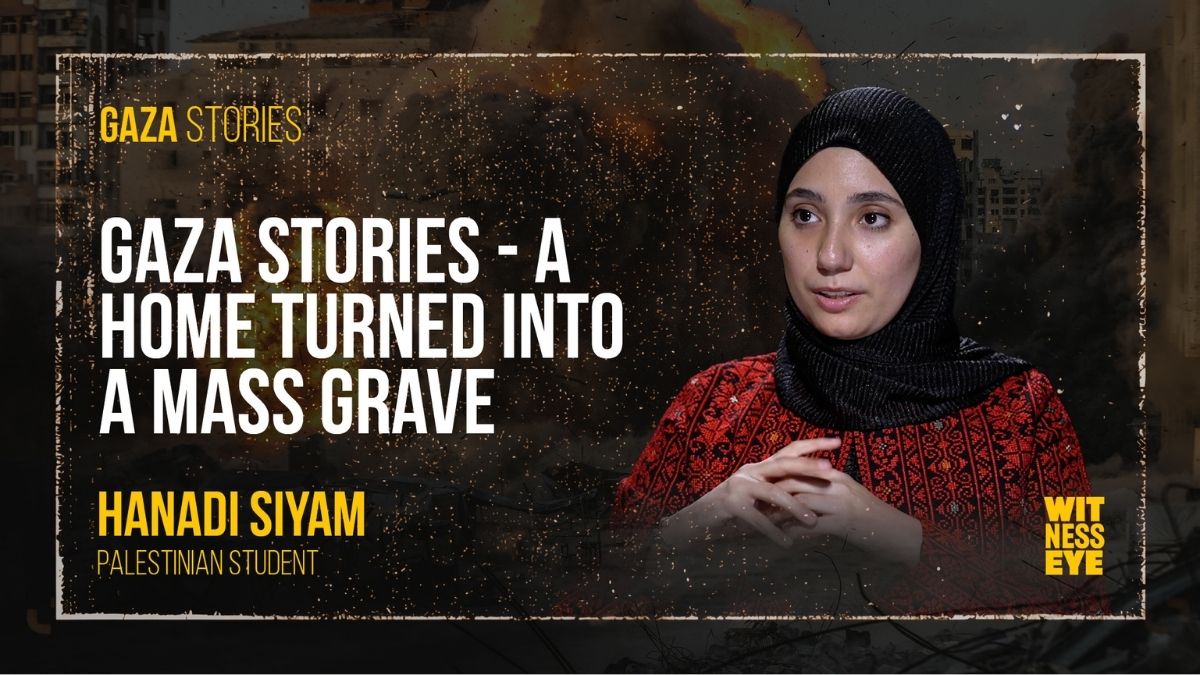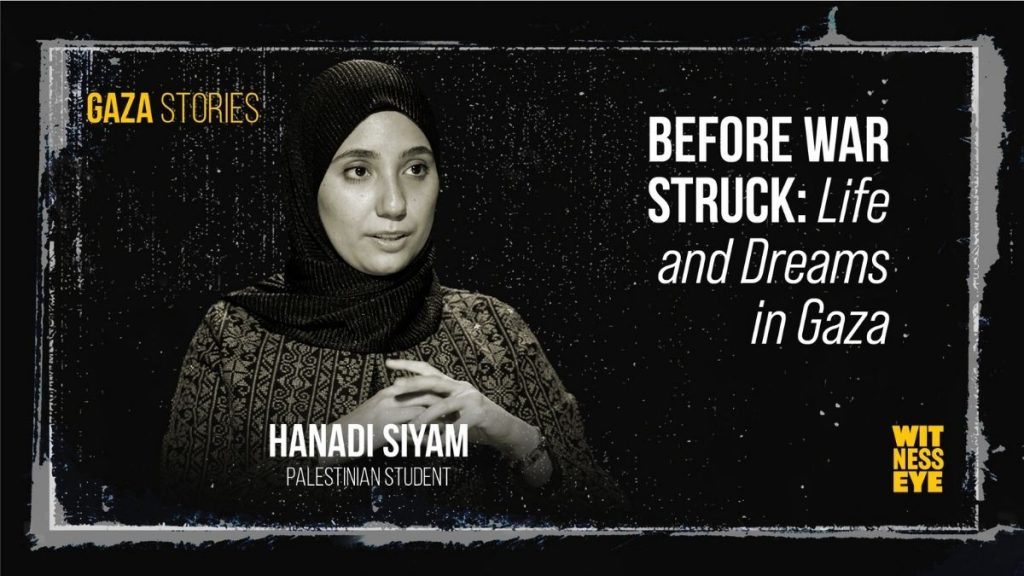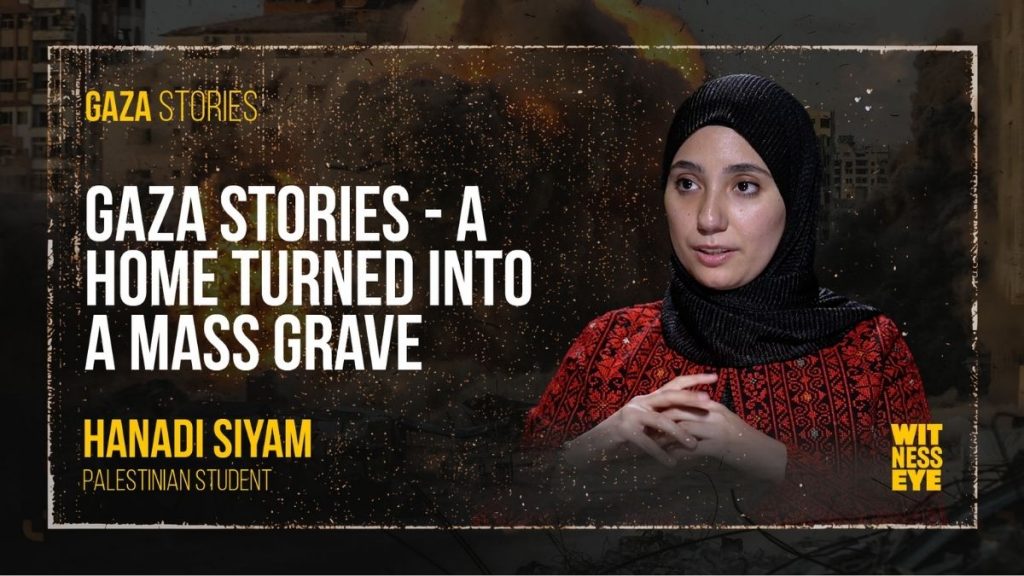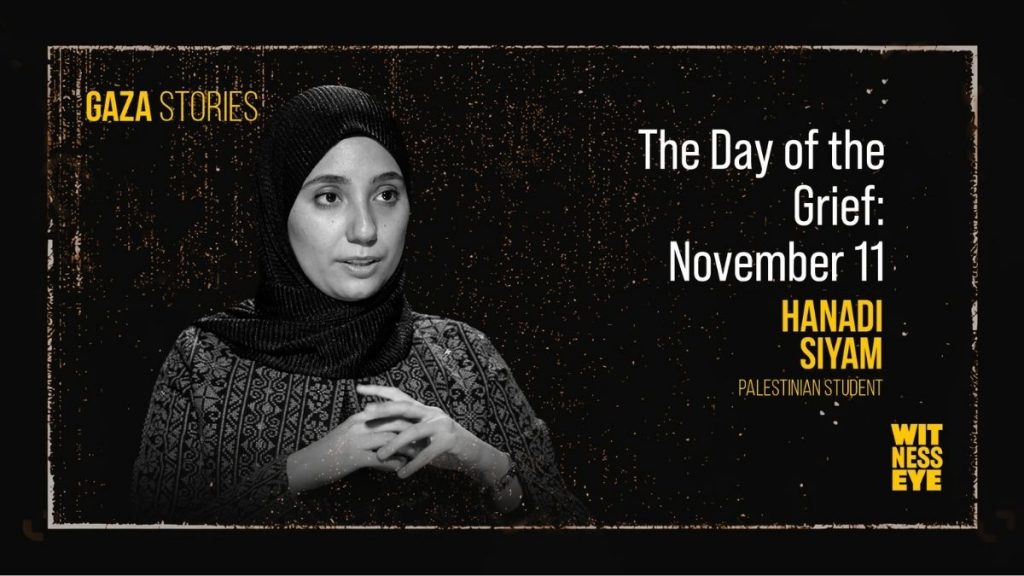
The call always came before the sun. “Wake up, wake up,” her mother would say, breathless with joy, letting the sound of mosque takbeers and the wind through the window spill into the receiver. On October 7, Hanadi Siyam woke to that voice again. “She made me live the moment,” Hanadi tells us. “Her voice, her laughter are still with me all the time.”
Gaza Stories lives inside these calls—ordinary mornings that split into before and after. Hanadi is a student, the eldest of five, a granddaughter who says the sea and the plants on a balcony taught her how to breathe. She studied Islamic Studies, earned a World Bank scholarship in marketing, built freelance work step by shaky step. “Life before October 7 resembled real life,” she says. “Outings and trips. Everyone had their dreams.”
Then the line frayed, and the ground shifted. In the weeks that followed, Hanadi lost her aunt and her brother-in-law. Then her grandmother. Then her mother and grandfather—sniped in their living room while the family crouched in the dark.
This is Gaza Stories as lived fact, as eyewitness testimony, and as a record for the world. It belongs alongside our archive of Eyewitness Testimonies, our Civilian Impact Reports, and our ongoing War Crimes Documentation.

Before War Struck: Life and Dreams in Gaza
Hanadi’s father worked as a contractor. Two sisters. Two brothers. She is the eldest. “Gaza was beautiful and still is, because of its people—their spirit, their cooperation, their gatherings.” She had left Gaza for the first time a year before the war to continue her studies. It was a brave crossing—Rafah, Cairo, a new language, a new classroom. “My family supported me a lot,” she says. “They saw that Hanadi deserved this opportunity.”
She promised to come home as a better version of herself. She carried that promise like a passport tucked under a palm. And then, “October 7 came and turned everything upside down.”
The Day of the Grief: November 11
On November 11, Hanadi was studying for an exam. Al Jazeera murmured in the background; the book glowed under a reading light. She called. No answer. She called again. Finally her father’s voice, “not normal,” she says. He tried to spare her until evening. But grief doesn’t wait for exams. “My uncle’s wife didn’t hide it from me,” Hanadi recalls. “I said, ‘Has someone been martyred?’” The first shock: her beloved aunt Sally and her youngest sister’s husband, Ibrahim.
“I couldn’t go to university,” she says. Professors wrote to check on the top student who had stopped appearing. “If you lose your scholarship, I’m ready to give you another,” one told her. She kept moving like a body on rails—attending, passing, not quite present.
In our Gaza Stories archive, loss hardly finishes naming itself before the next loss interrupts. This is why we keep a living Digital Evidence Archive and continue Civilian Casualty Mapping: so names are not swallowed by the speed of the days.
Zakiya: A Grandmother, A Mother, A Martyr
A month later, Hanadi’s grandmother—Zakiya—was martyred. She had gone to knead bread with a relative and bring it back to the family home. A six-storey residential building was hit without warning. “An ordinary civilian house. Civilian, civilian, civilian—nothing in it,” Hanadi says.
“My grandmother is my mother,” she tells us. “My refuge, my secret, tenderness and affection.” Zakiya’s balcony was crowded with mint, flowers, and cactus. She loved the sea. She grieved her daughter Sally and begged God at the window, “Take me to my daughter.” The strike answered with a cruel precision; she was martyred along with her relative and two children, Malak and Mohammed.
You can hear echoes of this grief in earlier pieces like “A Mother’s Last Words, A Family’s Goodbye” and in the wider search for the unaccounted in “Gaza’s Missing: Thousands Lost in the Shadow of War”. Each story expands the ledger of absence.
The Scent of Death

The next day, death came back for Hanadi’s mother and grandfather. Night fell heavy. The electricity was out. “We’re on the second floor,” she explains. “Our building consists of seven floors.” Families huddled together the way Gaza families do when the sky won’t stop talking. Her mother had prayed, set the rug aside, and made tea for everyone. She sat in prayer clothes, a sandwich in her hand.
“Girls, I smell the scent of death,” her mother had said all day. At 7 p.m., the shooting started. In the dark, it’s a maze of sounds—bullets, glass, screaming, breath. “My mother was martyred by sniping,” Hanadi says. “My sister tells me the bullet that came to my mother and grandfather was from ear to ear.” A quadcopter hovered outside and fired again. Her grandfather rose from his chair, turned on a phone flashlight, whispered, “This is Um Amer,” and fell.
“We were sitting with the corpses in front of us,” her sister told her later. “Three corpses. We couldn’t move at all.” A relative—Juma—managed to carry out a baby girl, then returned for an injured child, Malik, and was sniped while still holding him.
These scenes are not accidents of fog and panic. They sit inside patterns of attack that legal and investigative teams examine under International Humanitarian Law and in our developing Gaza Tribunal Reports and Forensic Investigations. When civilians in prayer clothes are targeted through thermal imaging in their own living rooms, that belongs to the public record under Crimes Against Humanity.
A Mother Buried in Gaza’s Silence
Hanadi found out from a Facebook line written by her uncle: “Yesterday I was son of the martyr, today I am son of the martyr.” She did the math instantly. If grandfather was gone and he was in their home, then her mother—who had held the night with prayer—was gone too.
“I fell to the ground and screamed ‘Mom,’ hoping she might hear me or I’d find an answer.” She reached her brother Amer two hours later. He cried and handed the phone to her sister. “Stay strong,” they said, afraid for the one far away, the one who can’t touch anything.
Then silence. For two months the networks were cut. One call confirmed the worst; then the world closed like a fist.
Gaza: Survival is a Job
“Now survival itself became a responsibility,” Hanadi says. Her father divides the day into tasks: someone for water, someone for food—if food can even be found. Her younger brother Maysara describes running toward bags of flour at the edge of death. “I would walk over corpses, jump over corpses,” he told her. Childhood is supposed to teach reverence for the body. Famine teaches something else.
When Hanadi asks for photos, the faces staring back seem older than their years. “The people are the same, but features changed. Fatigue changed. Personality changed.”
This is why we continue to collect Civilian Impact Reports and press for International Justice that recognizes the layered costs: hunger, displacement, the hyper-vigilance etched into a young person’s posture.
Gaza: Starting Study from Zero in Exile
There’s another track to the story—papers and stamps. If Hanadi stops her studies, she risks losing residency; if she continues, she studies across a minefield of notification pings. “I was certain I’m forced today to give up the scholarship… and start from zero,” she explains. She works, sends money, learns to survive in exile.
But she keeps one ritual that keeps her upright. “The only thing that makes me continue is my mother’s voice. My grandmother and grandfather. Their motivational messages. I always open our conversations; I feel them with me.”
This is where Gaza Stories belongs: inside a daughter talking to the dead, believing they watch and know. It stands with our Stories of Survival and our attempts at Gaza Justice, and it points back to the first sentence of this record: the call before morning, laughter in a kitchen, mint in a cup.
Gaza: The Voices That Keep Me Walking
“I still believe she’s with me in my details,” Hanadi says. “I hung their pictures in my house and say good morning and good evening to them.” She keeps walking because she can hear them rooting for her. “When Hanadi grows up, when she achieves something, how proud they’ll be of her. That’s why I continue—and will continue, God willing.”
This is Gaza Stories: not a headline’s flash but a ledger of breath, built from the words of people who refuse to let their dead disappear. If you’re new to this archive, start with the Gaza Stories category page, read the tribunal’s first public session in Bosnia, and sit with a family’s last phone call in “Final Words: Between Grief and Duty”. Let each page widen your sense of what justice must carry.
We’ve documented families erased from the civil registry, homes leveled without warning, corridors turned into shooting galleries. We’ve gathered footage and affidavits, mapped dates and coordinates under Destruction of Civilian Infrastructure and Military Conduct Analysis. We are building a case file for the future through the Gaza Tribunal and its evidence—because memory alone can be argued with, but layered evidence stands.
Stay Connected with Witness Eye
Follow us on our official channels:

